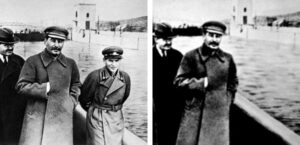As an instrument of political power, disinformation is as old as mankind but it has reached a different stage with the evolution of digital media and the intensification of global exchange. Infamous examples include the denial of historical events such as the Holocaust, the Gulag system, or the secret protocol of the Molotov–Ribbentrop Pact, as well as the deliberate dissemination of falsehoods and half-truths in the context of election campaigns.
What is disinformation in memory politics? How is it constructed, who is behind it and what are its aims? More importantly, what can we do to prevent the manipulation of historical facts? An international group of historians and communication specialists will answer these and other questions at a conference ‘Disinformation in Memory Politics: Practices and Ways of Prevention’.

The conference will stress the need for intensified scholarly and professional collaboration to defend historical and current facts against the challenges of political propaganda. A plenary discussion on theoretical and ethical approaches to truth and disinformation will be followed by six panel discussions on a range of topics: controversies over the memories of the Hitler and Stalin regimes; the role of conspiracy theories in populist politics; historical manipulations as a foreign policy instrument in contemporary Russia; or instrumentalisation of disinformation for political purposes. Rounding up the discussions, the final two sessions will focus on a critical appraisal of international strategies to combat disinformation and the development of general recommendations to prevent it in the field of memory politics.
The keynote lecture on ‘Old Sins, New Technologies: Weaponising Uncertainty in Times of Crisis’ will be delivered by Prof. Alina Bârgăoanu (SNSPA Bucharest). Multi-disciplinary speakers will offer a range of perspectives and include historians and political scientists as well as experts in communication, disinformation prevention and discourse analysis from the Czech Republic, Estonia, Germany, Hungary, Poland, Romania, Russia, Slovakia, the USA, and elsewhere.
An overview of the learning toolkit ‘No to Disinformation!’ (developed by ENRS in 2021) will also be included. This toolkit is available online from the platform Hi-Story Lessons (https://hi-storylessons.eu/no-to-disinformation/). ‘No to Disinformation!’ is an educational package for secondary schools to tackle historical manipulation and other aspects of disinformation. It familiarises teachers and learners with important recent disinformation campaigns and shows them how to verify information that they encounter on social media and the internet.
The conference is free and open to the public.
Live stream:
- You Tube – playlist: https://cutt.ly/disinformation-yt-playlist
- You Tube – Day 1: https://cutt.ly/disinformation-yt-day1
- You Tube – Day 2: https://cutt.ly/disinformation-yt-day2
- You Tube – Day 3: https://cutt.ly/disinformation-yt-day3
Live stream on Facebook: https://www.facebook.com/enrs.eu
‘No to Disinformation!’ learning toolkit: https://hi-storylessons.eu/no-to-disinformation/
The event is organised by the European Network Remembrance and Solidarity (ENRS, Warsaw), the College of Communication and Public Relations at the National University of Political Studies and Public Administration (SNSPA, Bucharest) and the National Institute for the Study of Totalitarianism (INST, Bucharest).
The international online conference takes place on 11-13 May 2021.




